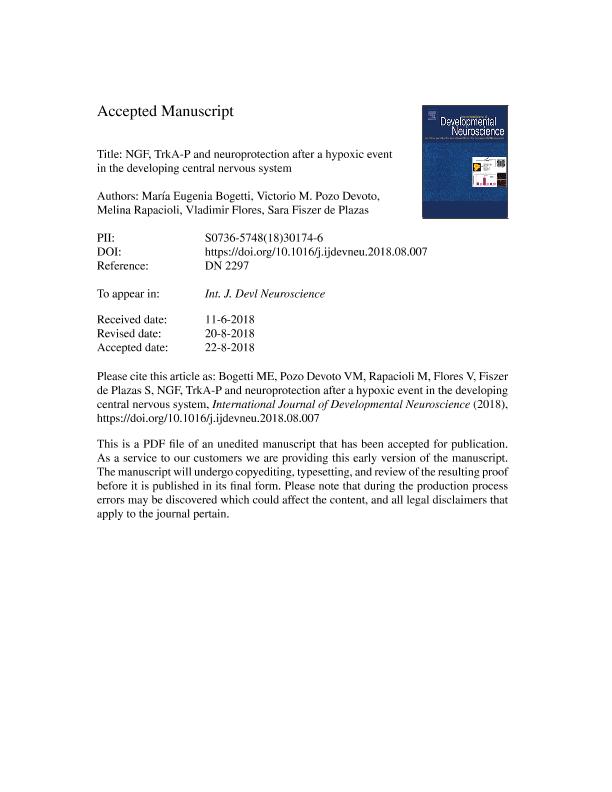Artículo
NGF, TrkA-P and neuroprotection after a hypoxic event in the developing central nervous system
Bogetti, María Eugenia; Pozo Devoto, Victorio Martin ; Rapacioli, Melina
; Rapacioli, Melina ; Flores, Domingo Vladimir
; Flores, Domingo Vladimir ; Fiszer de Plazas, Sara
; Fiszer de Plazas, Sara
 ; Rapacioli, Melina
; Rapacioli, Melina ; Flores, Domingo Vladimir
; Flores, Domingo Vladimir ; Fiszer de Plazas, Sara
; Fiszer de Plazas, Sara
Fecha de publicación:
12/2018
Editorial:
Pergamon-Elsevier Science Ltd
Revista:
International Journal of Developmental Neuroscience
ISSN:
0736-5748
Idioma:
Inglés
Tipo de recurso:
Artículo publicado
Clasificación temática:
Resumen
A decrease in the concentration of oxygen in the blood and tissues (hypoxia) produces important, sometimes irreversible, damages in the central nervous system (CNS) both during development and also postnatally. The present work aims at analyzing the expression of nerve growth factor (NGF) and p75 and the activation of TrkA in response to an acute normobaric hypoxic event and to evaluate the possible protective role of exogenous NGF. The developing chick optic tectum (OT), a recognized model of corticogenesis, was used as experimental system by means of in vivo and in vitro studies. Based on identification of the period of highest sensitivity of developmental programmed cell death (ED15) we show that hypoxia has a mild but reproducible effect that consist of a temporal increase of cell death 6 h after the end of a hypoxic treatment. Cell death was preceded by a significant early increase in the expression of Nerve Growth Factor (NGF) and its membrane receptor p75. In addition, we found a biphasic response of TrkA activation: a decrease during hypoxia followed by an increase −4 h later- that temporally coincide with the interval of NGF overexpression. To test the NGF - NGF receptors role in hypoxic cell death, we quantified, in primary neuronal cultures derived from ED15 OT, the levels of TrkA activation after an acute hypoxic treatment. A significant decline in the level of TrkA activation was observed during hypoxia followed, 24 h later, by significant cell death. Interestingly, this cell death can be reverted if TrkA inactivation during hypoxia is suppressed by the addition of NGF. Our results suggest that TrkA activation may play an important role in the survival of OT neurons subjected to acute hypoxia. The role of TrkA in neuronal survival after injury may be advantageously used for the generation of neuroprotective strategies to improve prenatal insult outcomes.
Palabras clave:
ACUTE HYPOXIA
,
CELL DEATH
,
NEUROPROTECTION
,
NEUROTROPHIN
,
OPTIC TECTUM
Archivos asociados
Licencia
Identificadores
Colecciones
Articulos(INCYT)
Articulos de INSTITUTO DE NEUROCIENCIAS COGNITIVAS Y TRASLACIONAL
Articulos de INSTITUTO DE NEUROCIENCIAS COGNITIVAS Y TRASLACIONAL
Citación
Bogetti, María Eugenia; Pozo Devoto, Victorio Martin; Rapacioli, Melina; Flores, Domingo Vladimir; Fiszer de Plazas, Sara; NGF, TrkA-P and neuroprotection after a hypoxic event in the developing central nervous system; Pergamon-Elsevier Science Ltd; International Journal of Developmental Neuroscience; 71; 1; 12-2018; 111-121
Compartir
Altmétricas



